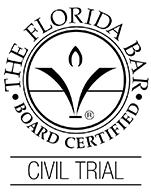Distracted Driving
Distracted driving is extremely dangerous and high-risk behavior. Despite most people’s awareness of the danger associated with this behavior, distracted driving is still a leading cause of car accidents in America, Florida included. Two thousand sixteen statistics provided by Florida Highway Safety and Motor Vehicles indicate that distracted driving resulted in over 50,000 accidents and 233 deaths.
[source: https://www.flhsmv.gov/2019/04/01/dont-drive-distracted-focus-on-driving/]
Defining Distracted Driving
Distracted driving refers to operating a vehicle on the roadway while engaged in any activity that could take your attention away from driving. Distractions typically fall into one of three categories- manual, visual, or cognitive. Manual distractions cause you to take your hands off the wheel. Visual distractions cause you to take your eyes off the road. Cognitive distractions cause you to think about anything other than driving.
Texting is typically the first thing that comes to mind when thinking of distracted driving and for a good reason. The act of texting involves all three categories of distractions, making it one of the most dangerous forms of distracted driving. However, there are still many other activities that can take your attention away from the road ahead.
Examples of common distractions include:
- Texting
- Using social media
- Adjusting music or volume
- Doing makeup or other forms of grooming
- Talking on the phone
- Talking to other passengers
- Eating and drinking
- Using GPS
- Taking pictures
Prevalence of Distracted Driving
Despite the known dangers it presents, distracted driving is a widespread occurrence. A study conducted by EverQuote, an online insurance marketplace, shows that approximately 92% of drivers use their phones while driving.
This is especially worrisome because distracted drivers are much more likely to have accidents. According to a report by the University of Utah, drivers using cell phones are five times more likely to get into a car accident than undistracted drivers.
Changes to Distracted Driving Laws in Florida
In the past, the usage of wireless communication devices while driving was a secondary offense in Florida. This means that drivers could not be pulled over by the police solely for being on their phone, but they could be additionally cited for it if stopped by a law enforcement officer for a different reason.
However, the ever-increasing dependence on cell phones as a primary means of communication has contributed to a growing number of distracted drivers on Florida roadways. State lawmakers have taken action to combat this threat to public safety, passing two new laws that took effect in 2019.
Florida statute 316.305, effective July 1, 2019, is known as the “Florida Ban on Texting While Driving Law.” This law aims to limit the dangers of distracted driving by changing phone usage while driving to a primary offense, meaning law enforcement may conduct a traffic stop based on the observance of this offense alone.
There are a few notable exceptions to the law, including the usage of a cellular device for navigational purposes or any usage of a device by a driver of a vehicle with its autonomous driving capabilities engaged. Refer to the statute for a complete list of exceptions to the prohibited use of wireless communication devices.
Florida statute 316.306, effective October 1, 2019, prohibits the use of wireless communication devices while driving specifically in school or work zones. The goal of this statute is to reduce the risk of crashes, personal injury, and death due to distracted driving, specifically in areas with a potentially high concentration of vulnerable pedestrians, like schoolchildren or workers whose focus is directed toward the job at hand rather than paying attention to traffic.
A Look into the Dangers of Distracted Driving
Even though most everyone agrees that distracted driving is hazardous, it is still a widespread problem, especially with drivers in the 16-24 age demographic. This is likely a result of the feeling of “invincibility” prevalent in young people.
Jack Dillon Young, a 20-year-old man from a small town near San Antonio, might have felt invincible as he swerved his pickup truck all over a Texas highway, eyes glued to his phone screen. But he wasn’t. Amidst his carelessness, officials say he crossed the centerline, striking a church van head-on. While Jack survived, 13 of the van’s passengers were not so lucky. He was later sentenced to 55 years in prison for his mistake.
[Source https://www.nbcnews.com/news/us-news/texas-man-indicted-church-bus-crash-killed-13-n778206]
Tragic stories like this one can be prevented. By maintaining safe and distraction-free driving habits, we can all do our part to make the roadway a safer place. Florida’s recent change in laws regarding distracted driving was made in an effort to prevent situations like Jack’s from happening.
A Distracted Driver Hit me. What Should I Do?
If you know or have reason to believe that the driver who caused your accident was using their phone while driving, you must make your attorney aware of this. A driver being distracted by their phone is a critical detail for car crash cases and can have a significant impact on the outcome of your case.
Trust a Qualified Attorney at Dismuke Law for Assistance
At Dismuke Law, we specialize in personal injury cases involving car accidents. If you have questions about Florida’s statutes surrounding distracted driving, or if you have been involved in a car crash in central Florida, give us a buzz at 1-800-ASK-DAVE. We’re here to help!


![cftla-member[2]](https://www.1800askdave.com/wp-content/uploads/2022/03/cftla-member2.png)
![cftla-member[3]](https://www.1800askdave.com/wp-content/uploads/2022/03/cftla-member3.png)










